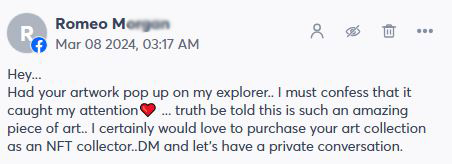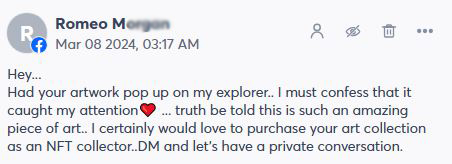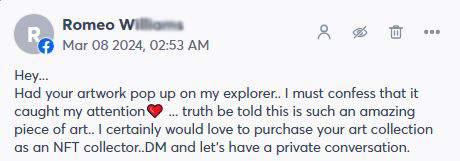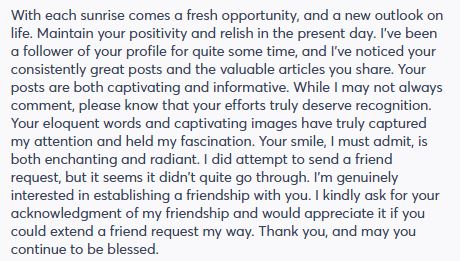“This is a beautiful painting. Is it still available for purchase?”
When we see a message like this from a stranger on social media, our first response is likely a stroke to the ego. Yes! Buy my art! But it’s worth noting that such a request is quite possibly fake, sent either by an individual with ulterior motives or a spambot.
Part of my role as Editor of Realism Today, Fine Art Today, and Plein Air Today, is to review comments that come to our social media pages, including Facebook, Instagram, and YouTube. Because the pages I manage represent broad brands that feature many artists, requests like these are no-brainer spam. It’s clear to me, as someone with many moons of professional social media experience behind me, but it might not be obvious to everyone who’s reading this. That’s why I began collecting screenshots to share as a warning to our artist friends. I’m looking out for you.
As you scroll through the art scams (and/or spam) below, you’ll notice that some are almost identical, which is why it’s easy to spot them. If you receive one on your page, the best thing to do is report the comment if possible, then delete it and move on.
For expert advice on how to sell your art, including through social media, check out ArtMarketing.com, which includes the Art Marketing Minute Podcast with Eric Rhoads.
Examples of Social Media Art Scams

1.

2.
![]()
3.

4.

5.
6.

7.

8.

9.

10.

Additional Social Media Spam Examples
11.

12.

13.

14.

Spam Friend Request Examples
15.

16.

Browse RealismToday.com for more art business tips and advice, and visit our sister site, ArtMarketing.com.






Unfortunately, these are EVERYWHERE. I’ve been getting (almost daily) Messenger “warnings” from bogus FB accounts stating that my page is in policy violation, I have posted something that is against rules, or is about to be closed due to an error. That I need to click on the link to fix the issue. DO NOT CLICK any links like this on social media. They are all scams. I forward them to FB or IG and then block the sender. Scammers are getting smarter. We have to be vigilant as to not become caught in their traps.
Yes, we see those constantly as well!
Good examples! Let’s hope my comment isn’t read by a spam bot!
Ha! Right? 🙂
Comments are closed.